 |
| I'm gonna puke. Photo by Steve Higgs |
What's most disturbing to me is the denial and magical thinking of the people in Wiesel's community at every step leading to their arrival at the camps, from believing that the war would end long before the Nazis would arrive in their community, to when they were confined to their homes, shuffled into ghettos, shaken down for their possessions of value, and herded onto the trains. From a socio-psychological point of view, this is morbidly fascinating and worth discussion with YA students in a language arts and/or social studies classroom. What inspired this line of thinking, and how would students react in a similar situation? What does it take to get them to act on their own?
There has been controversy over whether this is memoir, fiction, or both. The spine of the edition I own says autobiography. We know enough about what happened in the towns, in the ghettos, on the trains, in the camps, that even if some of these details are imagined, they're not incredibly far-fetched. I'm inclined to agree with the Syracuse faculty member, Karen Hall, who said, that the "literature of trauma" is invariably subjective: “For me, then, ‘Night’ is 100 percent true in its call to readers to remember the Holocaust, listen to and learn from its survivors, and never to allow such an event to take place again." Autobiographies and memoirs are inherently inaccurate, as banked memories fade or distort details, or are skewed by perspective. That should not lessen the impact of this book.* This leads to a more abstract discussion about truth, fiction, and the ramifications thereof, that concrete YA readers might not be able to grasp, but could work with a more sophisticated group.
Boring Stuff
Night, by Elie Wiesel
Latest edition: 2006 Hill & Wang
New translation by Marion Wiesel
*Look, the line spacing changed and I don't care to fix it!
No comments:
Post a Comment